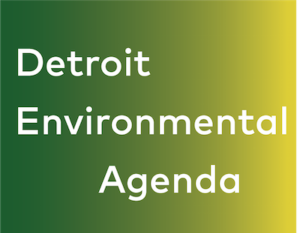Adopt a comprehensive water master plan for Detroit using the Detroit Water Agenda as guidance.
Protect and restore our waterways by reducing pollution from industries and stormwater runoff, including fertilizers and pesticides.

Green Garage Green Alley Photo Credit: ModelD Media
OPTIMIZE AVAILABLE LAND FOR BLUE AND GREEN INFRASTRUCTURE
Coordinate stormwater management with open space development and outdoor recreation in master plan and zoning updates
Support and expand the Detroit Water and Sewerage Department’s efforts for green infrastructure in coordination with regional efforts (Visit http://greenvalues.cnt.org/national/calculator.php to calculate the performance, costs and benefits of green infrastructure compared to conventional stormwater management)
Take a leadership role in the regional green infrastructure planning efforts, recognizing the impact of regional water consumption and wastewater on Detroit’s water and sewage system
SUPPORT WATER CONSERVATION AND STORMWATER INFILTRATION
Reconfigure the water bill to create incentives for water customers to help reduce pressure on water infrastructure (eg. Stormwater user fees, water conservation discounts, discounts for urban gardens, which do not use the sewer system. See the EPA’s online municipal handbook for green infrastructure incentives.)
Incentivize low impact development (eg. Fast track site plan review for low impact design)
Ensure that zoning and building-inspection standards support low-impact development and other creative solutions for water conservation and natural drainage (Visit SEMCOG’s guide to Integrating LID in Community Level, including examples of LID-friendly regulations. )
Act on ready opportunities nor natural drainage (eg. Backfilling demolition sites with water permeable soil)
Educate water users regarding the use of grey water
REDUCE WATER POLLUTION
Continue expanding non-motorized transportation options (walking, biking, public transit) that reduce stormwater runoff pollution
Encourage pollution prevention in industrial facilities
Limit industrial land uses and the expansion of existing ones near waterways and in disadvantaged communities already burdened, such as 48217 and 48209
Upgrade DWSD facilities and infrastructure for improved efficiencies and better water quality
Institute land use policies and zoning to protect against impact of land uses near waterways
Emphasize healthy fish consumption education to vulnerable populations (pregnant/nursing women, children)

